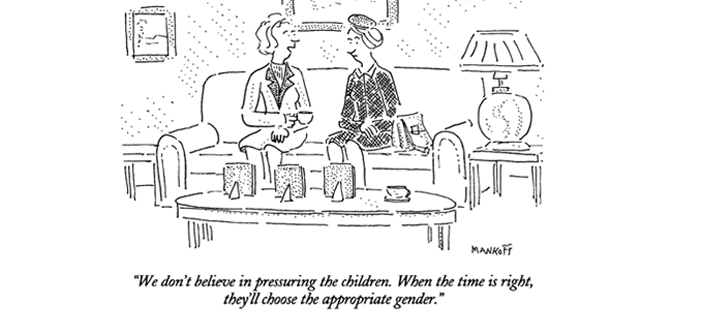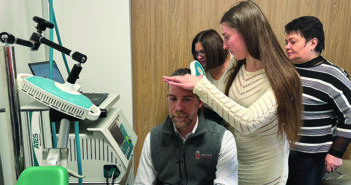Compassion is the baseline treatment for the transgender community.
The Association of American Medical Colleges recently released its first guidelines for improving health care for people who are LGBT, gender nonconforming, or born with differences of sex development, recognizing the special health care needs of these populations. The report identifies 30 competencies that physicians must master. Michelle M. Forcier, MD, MPH, associate professor of pediatrics and assistant dean for admissions at Alpert Medical School, runs the Child and Young Adult Gender and Sexual Health Services Clinic at Hasbro Children’s Hospital and says that ideally, specialty practices like hers will be unneeded—all primary care doctors will be prepared and comfortable with discussing the most sensitive aspects of their patients’ lives. Brown Medicine spoke with Forcier about her work.
What drew you to focus on gender identity and sexual health?
I am a pediatrician with a background in epidemiology, public health, and advocacy. “Taboo” issues such as child abuse, teen sexuality, contraception and abortion, gender identity, and sexual health interest me since these are things people don’t like to talk about and affect the most disadvantaged in our community. We listen to their stories and let them know someone from the health care community is interested.
Who are your patients and what are their common issues?
My patients are your colleagues, your neighbors, your uncle or niece. They range in age from 5 to 73. They come from all walks of life, all colors, all ethnicities and economic backgrounds. Their common
issue is that our culture is so incredibly uncomfortable with “other” folks who do not look or seem like “us.”
What exactly does transgender mean?
Gender is who we are. Sex is who we love. They are different but related. Gender is our maleness or femaleness, in our biology, in our expression, and most of all in our hearts and minds. For some, brain and body are on the same page; for others, their brain gender identity may not be the same as the hormones and parts they were assigned at birth. Gender is a web or fabric that we continuously construct over time with input from threads of nature, nurture,and culture.
At what age does gender identity begin and when is it an established part of a person’s identity?
Everybody creates a self and a life. It is a journey and a process. For some, it is as early as age 3 or 4, when many cisgender [when a person’s sense of his or her own gender matches the sex assigned at birth]kids realize that they are a boy or girl and that this is a stable part of their identity. For some, they realize that their body gender does not fit their brain gender around the time of puberty, and
all the hormones and shaping of an adult body that goes with puberty. For others, they begin their gender journey in adulthood, sometimes after career, marriage, and raising a family. It is very individual and our job as medical providers is to listen to what our patients tell us.
What do you recommend to all primary care doctors regarding talking to their patients about gender identity and sexuality?
Medical providers can ask e ach p arent and patient about their gender identity. It is as simple as asking parents, “What does your child enjoy doing? Who are their friends? Who do they model after in play?” For children, I just ask, “Do you feel more like a girl, boy, somewhere in between, or neither?” We can get incredible answers if we just wait and listen. No assumptions, just ask openended questions—ask, stop, and listen. Let your patient tell their story. Base your care on the patient’s paradigm.
Why is this work so important to you?
My patients are often bullied, hit, kicked, punched, called names, ostracized, and isolated. My patients have had death threats, threats to beat or rape them. My patients have been denied jobs, housing, and even compassionate medical care. I wanted to give people a voice who do not have a voice now. I wanted to listen to their stories and give them power by being heard and having their needs recognized and met.
Will the next generation of doctors be better at discussing gender and sexuality with their patients?
It is a very exciting time to be a part of learning and working with the next generations of medical providers. All the new young docs are completely excited about learning about this. This is a new and different generation who wants to hear these stories of identity. If we do our job well, the upcoming generations of pediatricians and primary care providers will be much more savvy and comfortable regarding gender and sexual diversity. If we work hard to create understanding and acceptance of gender and sexual diversity in the medical and public health arenas, then this will not be a unique specialty practice, but well integrated into everyone’s primary and general health care. It would be great to have many trans sensitive and caring docs—it would be great for my gender practice to become obsolete.




